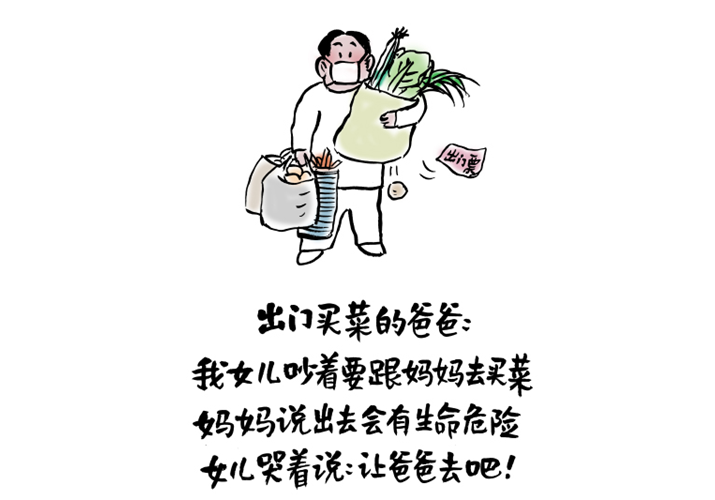| Lifestyle |
| Strokes of Support | |
| Big-hearted cartoonist encourages the use of art for emotional therapy | |
|
|
 My daughter cried to go grocery shopping with her mom. Her mom told her it was dangerous to go out. Ok, let daddy go then, she said (COURTESY PHOTO)
Li Qing, a nurse at the Sun Yat-sen Memorial Hospital in Guangdong Province, south China, was sent to work in Wuhan, the epicenter of the outbreak of the novel coronavirus disease in Hubei Province in central China, as a member of the provincial medical team. But during her stint in the city under lockdown, the 30-year-old did another duty as well. She "curated" an "exhibition" organized to provide emotional support to the medical workers soldiering on in the face of risk and death. The display, put up at the building where she and her peers have been billeted in Wuhan, consisted of cartoons created by a fellow spirit. Lin Dihuan, a graduate from the Department of Clinical Medicine at the Zhongshan School of Medicine, Sun Yat-sen University, is a university teacher and photographer as well as a cartoonist. On February 1, when the "exhibition" opened, art critics may have found it a primitive affair. All the cartoons were downloaded from the Internet and the bare printouts were stuck on the wall using transparent tape. However, all the medical team members loved it. "I could imagine the smiles on their exhausted faces when they saw the cartoons," Li said. "Our focus as medical workers here is to cure patients and instill confidence in them that they will be cured. However, we are often tired and overstressed ourselves, especially weighed down by our protective clothing, goggles and face masks which are also very restrictive. Spiritual support is important at this moment, and Lin's cartoons provide that." Far away from central China, Lin, working in Guangzhou, capital of Guangdong Province in south China, came to know his cartoons were being used to encourage the medical team. So he decided to send some gifts to these special fans. He selected a batch of high-definition cartoons that he described as "warm and inspirational, both to encourage persistence and help to relax" from his collection over the years, adding some new ones drawn especially for the event. In addition to the artworks, he also sent 300 custom-made chocolates packed in boxes with his cartoons on top. They were his Valentine's Day gift to the medical team, who called those their sweetest presents. "I pray that they don't get anxious during their hard work and that their moods are lightened," Lin said. His cartoons began to go public since 2015, when he stared posting them on the Internet. They were reposted by viewers and brought him a lot of admiration and encouragement. His posts on his WeChat public account XiaoLin, which is also his nickname, have received more than 100,000 views. Lin's cartoons present a single and simple scene with a few economic strokes. They come with a short punchline that is easy to understand. A salient feature of the work is his use of ink painting. The technique emerged in the Tang Dynasty (618-907) and flourished in the Song Dynasty (960-1279), with the emphasis on brushwork shades of black and the depiction of the perceived essence of the subject instead of accurate but blind imitation. In November 2016, the 24 Chinese solar terms, the traditional periods marked in the Chinese lunisolar calendar calculated according to the movement of the moon and the sun to facilitate agriculture and related activities, were added to UNESCO's Intangible Cultural Heritage List. Lin had a part in the process. His paintings on the 24 solar terms were used as a promotional poster when the Chinese Government applied for inclusion in the list. According to Lin, he seeks to capture the spirit of the times and observe ordinary people's spiritual life. Art, to him, has the function of healing, like medical science. He joined the Sun Yat-sen Memorial Hospital last year as a visiting professor where he was responsible for setting up a new therapy department based on the humanities and arts. The therapy explores the introduction of a comprehensive method by integrating music and painting into clinical medicine to improve the efficacy of treatment of cancer patients and patients with chronic cardiovascular diseases. On February 26, the Wuhan Center for Disease Control and Prevention distributed 1,000 free copies of Wuhan Must Win, an inspirational booklet to encourage patients and medical staff. The book contained Lin's cartoons to comfort readers and make them smile. Lin hopes people pay attention to their mental health as well while they are confined to their homes during the outbreak. "There could be an emotional storm in the future. The turning point of the epidemic has not yet come, but the turning point in the heart is of vital importance. You can be the hero of this sad situation if you can control your emotions," he said. And his wish is to continue helping as many people as he can through his art to prevent emotional injury. Copyedited by Sudeshna Sarkar Comments to zhaowei@bjreview.com |
|
||||||||||||||||||||||||||||
|